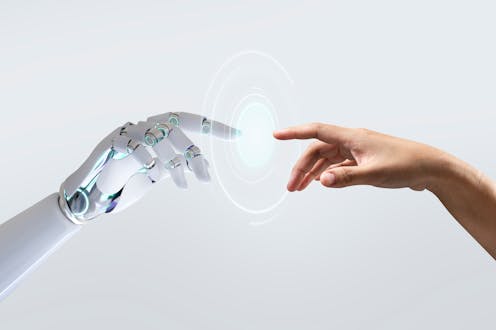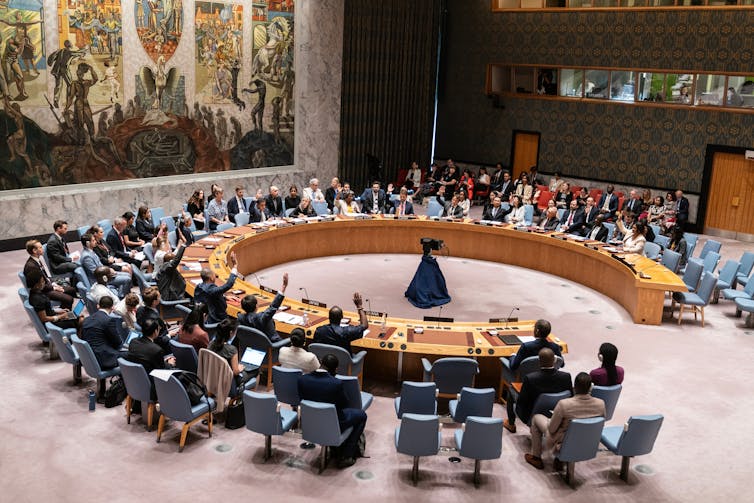
Artificial intelligence (AI) will have serious societal impact globally. So it is more urgent than ever that state leaders cooperate to regulate the technology.
There have been various calls already: the Bletchley Declaration at a recent UK summit and the 11 AI principles and code of conduct agreed on by G7 leaders, for example. But these largely state the obvious. The real question is not whether international cooperation on AI is needed, but how can it be realised?
The most obvious way to secure this in a way that maximises the benefits of AI, and puts in “guardrails” – controls – to manage the significant risks posed, is to set up an intergovernmental body.
Indeed, one idea is to create a World Technology Organisation. Others advocate for a body similar to the International Atomic Energy Agency (IAEA), drawing a comparison between AI and nuclear weapons in terms of the risks posed.
Another view is to develop an institutional framework inspired by entities such as Cern, the Human Genome Project, or the International Space Station (ISS).
However, creating an AI or technology-specific international organisation, whatever it may be called, faces three particularly difficult challenges.
Friction between powers
First, with AI being a dual use technology – which means it is capable of being deployed for both peaceful and military purposes – it is unlikely that the major powers would be willing to come together to form a global institution that can meaningfully police its development and use.
The so called chip war between the US and China is in full flow. AI technology is also the subject of intense geopolitical competition. The friction between the major powers creates serious hurdles for international cooperation on AI in particular.
In fact, existing international institutions built following the Second World War are already structurally affected by interstate friction. For example, the UN Security Council continues to be paralysed on the greatest controversies of international concern today.
The Appellate Body of the World Trade Organisation, one of the most successful international mechanisms for adjudicating on trade issues in the past, is currently dysfunctional because the US refuses to endorse judicial appointments to it. But, even before its demise, I argued that it encountered significant structural deficits.

The major international financial institutions are also facing serious governance challenges. The G20 leaders recently called for reforms to the World Bank and the International Monetary Fund (IMF) and for their roles to become more clearly defined.
With existing international institutions in crisis, it is hard to imagine that a stand-alone international organisation to regulate AI can be created any time soon.
What will an AI-focused organisation do?
Second, even if the international community somehow agrees to create an AI or tech-specific regulating body, the question remains what will this organisation actually do? Would an AI-focused organisation seek to enhance scientific cooperation between different research groups, or will it try to coordinate AI regulation across countries.
Would any such organisation create a monitoring regime to ensure that only human-centric, trustworthy and responsible AI is developed? How would such a regime come into operation and carry out enforcement? Would it also be mandated to help developing and the least developed countries realise AI’s full potential?
Sovereignty concerns, national security, perceived national interest and, ultimately, different approaches taken to AI, mean that reaching a valuable consensus on what such an organisation should do is likely to remain elusive for some time. Already, we see different choices made on AI regulatory frameworks and deployment. While the EU’s AI act outlaws social scoring and real-time facial recognition, authoritarian states take a different approach.
It is thus important not to get carried away by generalised statements by the international community, giving the impression that an international law on AI may be emerging. Hardly anyone would disagree that society needs to be protected from the risks posed by AI. Its deployment should not undermine human rights and it should be safe and trustworthy.
But it is the translation of such generalised principles into specific commitments made in international law that poses a significant challenge.
Risk assessments on AI tools may yield distinct results depending on who carries them out. Which rights ought to be prioritised – individual rights versus security interests – might differ across different countries. So would what constitutes ethical forms of AI.
What role for private actors?
The third main challenge in creating an international overseeing body relates to the institutional character that ought to be adopted. This includes the role that the private sector is given in any governance framework.
Given the very significant role of the private sector in developing and deploying AI tools, a joint public-private governance model may be the only realistic option. Presently, it is countries that are the central actors in the international community.
Incorporating private companies into an international governance structure that generally favours nations over everything else could pose problems. That’s a challenge that must be overcome before such an organisation is created.
Finally, international cooperation on AI already exists to some extent. Organisations, including the OECD, UNESCO and the International Organization for Standardization have already developed recommendations or standards in the spheres of their expertise.
Other bodies, such as the International Labour Organisation and the World Health Organization have started to consider the impact of AI in their mandates.
The UN has also established a High-Level Advisory Body on AI to undertake analysis and advance recommendations for the international governance of this technology. It is too early to conclude whether this fragmented approach can lead to a well thought out and coordinated response.
Until the circumstances are right for creating a standalone AI-focused international organisation, what is almost certain is that powerful actors, such as the US – where most tech-companies are based – and the European Union’s AI Act will have an outsized influence on the content of AI regulation and governance globally.
Rishi Gulati does not work for, consult, own shares in or receive funding from any company or organisation that would benefit from this article, and has disclosed no relevant affiliations beyond their academic appointment.
This article was originally published on The Conversation. Read the original article.







